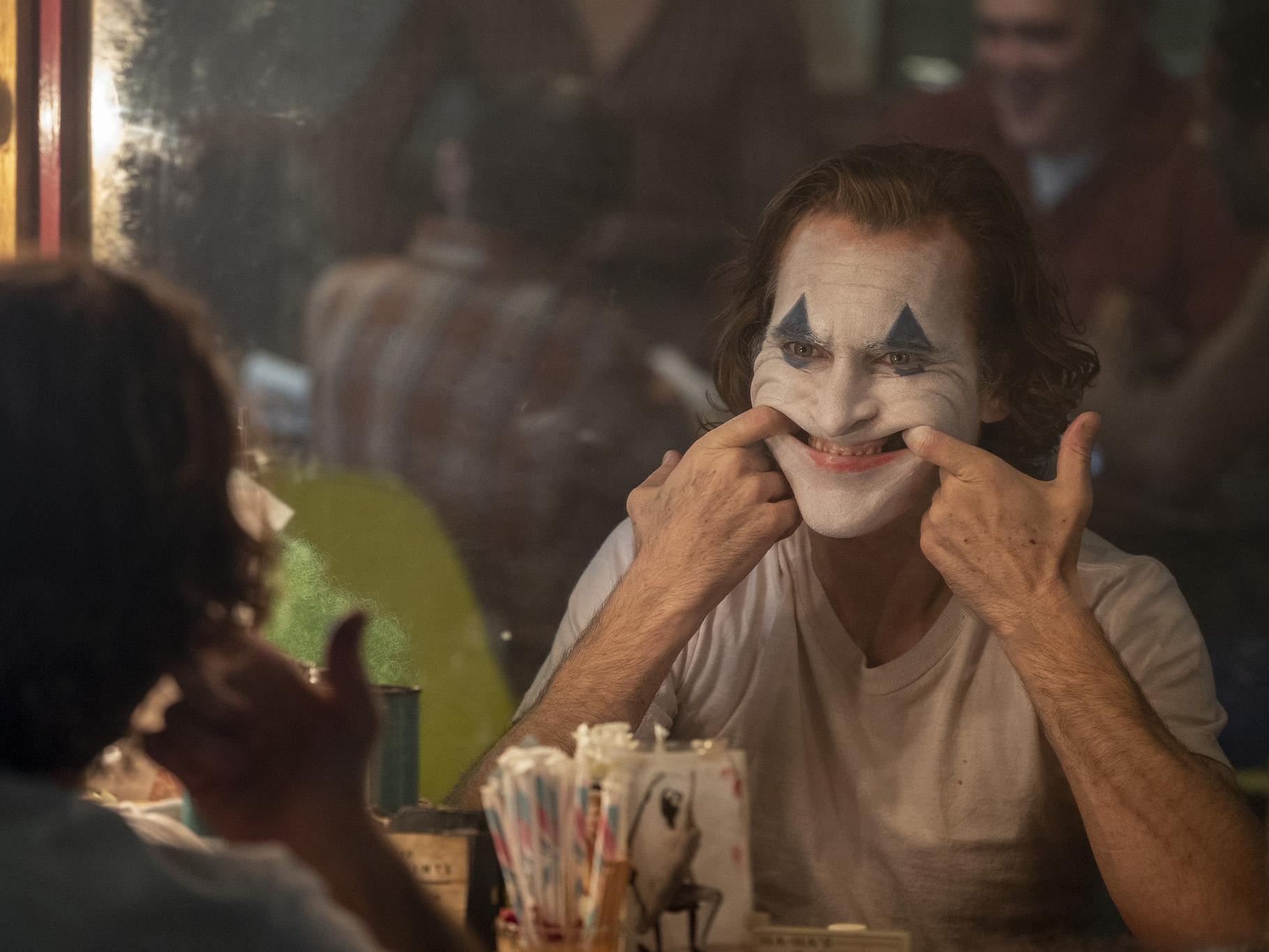A masterpiece for the ages or a flat-out danger to society? Joker isn’t smart enough to be either
Todd Phillips’ new film depicts the comic book supervillain as an innocent, yet delusional man, writes Clarisse Loughrey. But its mishmash of influences hopes to distract you from the fact it has little to say


Your support helps us to tell the story
From reproductive rights to climate change to Big Tech, The Independent is on the ground when the story is developing. Whether it's investigating the financials of Elon Musk's pro-Trump PAC or producing our latest documentary, 'The A Word', which shines a light on the American women fighting for reproductive rights, we know how important it is to parse out the facts from the messaging.
At such a critical moment in US history, we need reporters on the ground. Your donation allows us to keep sending journalists to speak to both sides of the story.
The Independent is trusted by Americans across the entire political spectrum. And unlike many other quality news outlets, we choose not to lock Americans out of our reporting and analysis with paywalls. We believe quality journalism should be available to everyone, paid for by those who can afford it.
Your support makes all the difference.My reaction to Joker wasn’t at all what I expected. Ever since the film’s premiere at the Venice Film Festival, I’d been assured that there are only two schools of thought here: it’s either a masterpiece for the ages or a flat-out danger to society. The first was bolstered by the fact it won Venice’s highest prize, the Golden Lion, and has since earned its fair share of awards buzz. The second was made concrete by plans for an increased police presence at US cinemas on opening weekend, due to vague and entirely unconfirmed threats of violence.
Yet I found it hard to be provoked either way. The film simply doesn’t seem smart enough to earn such extreme reactions. Todd Phillips, Joker’s director and co-writer, may have aimed for a radical rewriting of the iconic Batman villain’s origins, but what he cooked up was a bunch of derivative half-concepts shot with a Scorsese tinge and the prestige of one of Phoenix’s full-throated, committed performances.
The Joker, otherwise known as Arthur Fleck, is depicted as an initially innocent but deeply delusional and mentally ill man, who’s repeatedly kicked while he’s down. Nobody cares about the wannabe stand-up comedian who dresses as a clown for a living and still lives with his mother. He reaches a breaking point and, next thing you know, he’s gone full supervillain. While Arthur’s interested only in revenge against those who’ve been cruel to him, Gotham’s impoverished and oppressed population increasingly interpret his actions as a revolt against the 1 per cent, meaning the film has echoes of Bane’s storyline from The Dark Knight Rises. There are nods, too, to classics such as Taxi Driver, A Clockwork Orange, and Psycho – a busy mishmash of influences that hopes to distract you from the fact it has nothing of its own to say. That is, outside of the sincere conviction that there’s something profound in the line: “I used to think my life was a tragedy. But now I realise, it’s a comedy”.
Clearly, the film’s many glowing reviews confirm that others see much more in it than I do. And yet, I had just as much trouble pinpointing where all these accusations that Joker is an “incel manifesto” come from. To accuse it of such fundamentally misunderstands the threat these people pose on society. The term, which stands for “involuntary celibate”, is commonly used to describe men who see themselves as fundamentally entitled to sex, and view violence as an acceptable form of revenge against those who would block their access to it. It’s garden variety misogyny, but with an intensity and a bitterness that is deeply terrifying, having been established as the motivation behind at least four mass murders.
But none of this ideology is actually present in Joker, since his rage is unconnected with any desire for sexual dominance. He’s infatuated with one of his neighbours (played by Zazie Beetz) and certainly has a creepy way of trying to pursue her, but the film is careful not to suggest that he has violent thoughts about her. Joker doesn’t have Arthur make any real statement beyond “everybody is awful these days”, which is a pretty toothless idea on the whole.
The most alarming aspect of the film, in fact, is how it wheels out the age-old, deeply insulting idea that mentally ill people are just one missed prescription away from mass murder (as people have to be reminded every time this is mentioned in the gun control debate, a mentally ill person is much more of a danger to themselves than to anyone else). Even those who had the most right to protest this film’s release – the families of victims of 2012’s Aurora shooting, which took place at a showing of The Dark Knight Rises – released a joint letter that voiced their concerns to Warner Bros, but asked only that the studio uses its immense platform to advocate for gun control (it’s worth noting that the widely circulated rumour that the killer was inspired by the Joker has since been proven false).
Joker is a perfect example of how easily we can lose control of certain narratives. A handful of reactions to the film’s Venice Film Festival premiere mentioned how it could potentially be co-opted by incels and their ilk, but not in any way that felt particularly alarmist about it. Yet the word was immediately zeroed in on and picked up by largely well-meaning people who hadn’t actually seen the film, but who still echoed and amplified the notion until it became “that incel movie”. It’s a direct symptom of our internet habits: a day spent scrolling through social media forces our brains to process an incredible amount of information. Inevitably, it’s always the boldest words and ideas that stick out.
The truth is, incels and right-wing trolls were drawing from the Joker – in their memes, their profile pictures, or by using his quotes – long before Phoenix ever stepped into his shoes. The fact he’s now been given a backstory that partially humanises him is hardly going to have much more of an impact. He’s edgy and anarchic – they didn’t really need an excuse to adopt him as their own.
There’s certainly a conversation to be had about what we do when characters have been appropriated in ways that wilfully misinterpret their meaning (the same way certain men fixate over Fight Club or The Wolf of Wall Street in all the wrong ways). Maybe that’s the conversation we should be having about Joker, but it feels too late for that now.
Joker is out now
Join our commenting forum
Join thought-provoking conversations, follow other Independent readers and see their replies
Comments